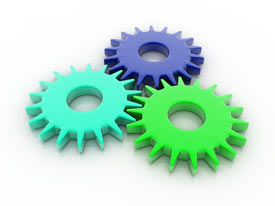 For many new owners of small businesses, the task of bookkeeping seems daunting. However, once you master a few basic concepts, balancing your books or checking behind your accounting professional will become fairly easy.
For many new owners of small businesses, the task of bookkeeping seems daunting. However, once you master a few basic concepts, balancing your books or checking behind your accounting professional will become fairly easy.
When you perform accounting tasks for your small business, you have two basic goals in mind: keeping track of your revenues and expenses, and identifying how you can maximize the former and reduce the latter; and having your ducks in a row for tax purposes.
When starting a new business, you have a clean slate to create a bookkeeping system for your compnay. This gives you the freedom to develop and implement a bookkeeping system that best fits your business and your own financial management acumen.
While some small businesses operate with a manual ledger, your best bet is to use an automated system, as many bookkeeping software applications are on the market and are very affordable. Accounting software can be industry-specific, but there are also a variety of generic programs that are appropriate for most new business ventures.
Whatever accounting program you choose should meet three basic requirements.
Accuracy – An automated system will help you keep the numbers straight, but it’s only as good as the person putting them into the system. Check and re-check your figures to make sure your numbers are correct.
Relevancy – A good software application will provide the information you need to analyze your business and comply with state. local and federal tax law. If your program can’t do this, it’s junk.
Accessibility – A good accounting program needs to be understandable and have a conveninent user interface. If it takes seven clicks to do the simplest application, or if you constantly need help to interpret the requests the program is making, you’ve got a bad program.
Cash Basis or Accrual Basis
One of the primary questions you’ll have to answer when choosing how to do your books is which system you want to use, a cash basis or accural system. The accrual system is the more popular of the two, but it may not be appropriate for some businesses.
The cash method is the simplest of the two methods as your books are maintained based solely on the cash flow in and out of your business. Income is logged when you receiv it, and expenses are reported when they are paid. For sole proprietors, or businesses with no inventory, this system works well.
Also, new businesses may want to use the cash method as it can be advantageous for tax purposes in their first year of business, as expenses will be accounted immediately, while recording income can be delayed until the next tax year.
In the accural method, income and expenses are documented as they occur, whether cash has changed hands or not. For example, a sale on credit will be immediately recorded as income, even though the cash has not been collected yet. Also, expenses are recorded when materials are ordered or when work has been performed, not when payment for the goods or services are rendered.









